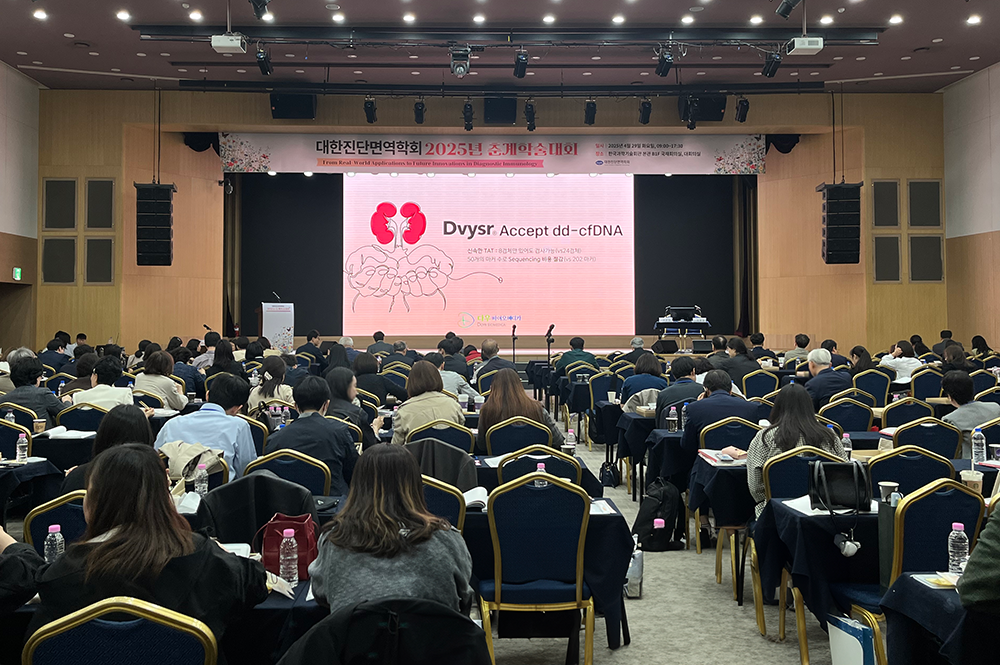Dow Biomedica Unveils Non-Invasive Genetic Test for Early Detection of Kidney Transplant Complications
- 등록일 : 2025-05-07
다우바이오메디카가 지난달 29일 서울 강남구 한국과학기술회관에서 열린 대한진단면역학회 학술대회에서 신장이식 환자 관리를 위한 비침습적 유전자 검사 기술을 공개했다고 7일 밝혔다.
다우바이오가 이번에 소개한 'Accept dd-cfDNA' 검사법은 혈액 속 기증자 유래 DNA 비율을 정밀 측정해 이식된 신장의 안정성 여부를 평가한다. 혈액 샘플 8개만으로 검사를 수행할 수 있어 시약 손실 우려를 덜었다. 검사 결과는 하루 이내 제공한다. 기존 혈청 크레아티닌 측정이나 도플러 초음파, 조직검사와 비교해 민감도와 속도가 우수하다고 회사는 강조했다.
국내에서는 매년 3000건가량 신장이식이 시행되는데, 이식자 10~15%는 5년 내에 급성 거부반응이나 면역억제제 독성 등으로 기능을 상실해 재투석으로 받게 된다. 이번 dd-cfDNA 검사는 기증자 유래 DNA 비율에 따라 이식 신장 상태를 세분화해 판단할 수 있다. 예를 들어 기증자 유래 DNA 비율이 0.5% 이하에서는 안정된 상태로, 0.5~1.0% 사이에서는 기증자 특이 항체(DSA) 발생 가능성을, 1.0% 이상에서는 면역반응이나 독성 가능성을 시사한다.
다우바이오메디카 관계자는 “이번 검사법은 신장이식 환자 상태를 보다 빠르고 정확하게 파악해, 불필요한 조직검사를 줄이고 조기 치료 개입이 가능한 점에서 의미가 있다”면서 “임상에 점진적으로 도입될 경우 환자 생존율과 삶의 질 개선에도 기여할 수 있다”고 말했다.

Dow Biomedica Unveils Non-Invasive Genetic Test for Early Detection of Kidney Transplant Complications
Dow Biomedica announced on July 7 the introduction of a new non-invasive genetic test designed to detect early signs of kidney transplant rejection, eliminating the need for invasive biopsies. The test, Accept dd-cfDNA, was presented at the 2025 Spring Conference of the Korean Society for Diagnostic Immunology, held on June 29 at the Korea Science and Technology Center in Seoul.
The Accept dd-cfDNA test analyzes donor-derived cell-free DNA (dd-cfDNA) levels in the recipient’s blood to assess the health of the transplanted kidney. Using just 8 blood samples, the test minimizes reagent loss and delivers results within a single day. Compared to conventional methods such as serum creatinine monitoring, Doppler ultrasound, or kidney biopsy, the test offers superior sensitivity and faster turnaround.
In Korea, approximately 3,000 kidney transplants are performed annually. However, 10–15% of recipients experience acute rejection or drug toxicity within five years, leading to graft failure and return to dialysis. The dd-cfDNA test enables stratified assessment of graft status based on dd-cfDNA concentration:
-
≤0.5%: stable condition
-
0.5–1.0%: potential for donor-specific antibody (DSA) development
-
≥1.0%: suggests immune response or toxicity
“This test allows for faster and more accurate assessment of kidney transplant recipients, reducing the need for unnecessary biopsies and enabling timely clinical intervention,” said a Dow Biomedica spokesperson. “Its gradual adoption in clinical practice could significantly improve patient survival and quality of life.”


